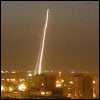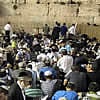Ten Israeli soldiers were killed on Monday, four in a mortar attack near the Gaza border, and five others who were defendng against an infiltration from a tunnel into a kibbutz, a spokesman for the Israel Defense Forces confirmed this evening. Six were wounded in the shelling, some critically, as Israel continued to bury its fallen soldiers throughout the day. The wounded were rushed to Israeli hospitals, where 122 combat troops were undergoing treatment for injuries sustained in the Gaza operation.
According to an IDF statement, funeral arrangements have been established for the five soldiers who were killed earlier in the day: Staff Sgt. Eliav Eliyahu Haim Kahlon, 22, of Safed, one of four soldiers of the armored corps who was killed by mortar fire, will be buried at the military cemetery in Safed at 11 a.m.; Cpl. Meidan Maymon Biton, 20, of Netivot, will be buried at 3 p.m. on Tuesday in the city’s military cemetery; Cpl. Niram Cohen, 20, of Tiberias, will be laid to rest at 5 p.m. at the military cemetery in the city; SSgt. Adi Briga, 23, of Beit Shikma, will be buried at 4 p.m. at the military cemetery in Ashkelon.
Staff Sgt. Moshe Davino, 20, of Jerusalem—a soldier in the Combat Engineering Corps who was killed earlier in the day in Gaza when terrorists fired a rocket at his vehicle while he and his fellow soldiers were uncovering a tunnel into Israel—will be laid to rest at 3 p.m. on Tuesday at the Mount Herzl military cemetery.
The IDF also announced early Tuesday morning that five IDF soldiers were killed when terrorists attempted to infiltrate Israel using a tunnel from the Gaza Strip to Kibbutz Nahal Oz.
“The soldiers thwarted the attempt by identifying the squad and neutralizing one of the terrorists,” the IDF said in a statement.
The five soldiers killed in the tunnel attack are Sgt. Daniel Kedmi, 18, from Tsofim; Sgt. Barkey Ishai Shor, 21, from Jerusalem; Sgt. Sagi Erez, 19, from Kiryat Ata; Sgt. Dor Dery, 18, from Jerusalem; and Sgt. Nadav Raimond, 19, from Shdamot Devorah.
Funeral arrangements have not yet been announced for all of the soldiers killed during the tunnel infiltration. This raises the total IDF death toll to 53. Two Israeli civilians and a Thai worker have also died as a direct result of the conflict.
A Call for Special Prayers for the Wounded
Late last week, the Chabad Youth Organization of Israel placed ads in Israeli media providing the Hebrew names of injured soldiers, along with their mothers’ first names; listed the hospitals in which they are being treated; and called for prayers for their speedy recovery.
In addition to prayers for the wounded, thousands of people from Israel and abroad are doing the mitzvah of bikur cholim, (visiting the sick), spending time where permitted with soldiers at the hospitals where they are being treated.
As of Monday morning, 38 soldiers are undergoing treatment at the Soroka Medical Center in Beersheva; 30 are at the Sheba Medical Center outside of Tel Aviv; 34 are at the Barzilai Medical Center in Ashkelon; 19 are undergoing treatment at Beilinson Hospital in Petach Tikvah; and one soldier is currently hospitalized at Tel Aviv’s Ichilov Hospital.
For security reasons and so as not to overwhelm the sick, well-wishers are asked to contact the hospitals prior to arrival.
Chabad.org has also set up a special web page where people can dedicate a mitzvah and write a note to IDF soldiers in general.
Mitzvahs and notes can be specifically directed to the wounded, and printouts will be hand-delivered by staff and volunteers of the Chabad Terror Victims Project.
For more news, impressions, mitzvahs and prayers related to “Operation Protective Edge,” click here.
The following is the notice containing the Hebrew names of those who were hospitalized as of last Friday, along with their mothers’ names, which are to be used in prayers for a speedy and complete recovery.
Readers can click on the photo of the ad below for a full-size image of the ad for easier viewing of the names of the hospitalized soldiers.









Start a Discussion